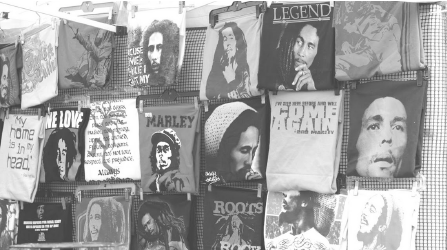
Until the philosophy which hold one race / Superior and another inferior / Is finally and permanently discredited and abandoned / Everywhere is war, me say war / That until there are no longer first class / And second class citizens of any nation/ Until the color of a man’s skin /Is of no more significance than the color of his eyes /Me say war.This is a part from the UN General Assembly speech of Ethiopian Emperor Haile Selassie I who, in some way, refrained the “unofficial” anthem for the African liberation struggle. Or alternatively, it is the song “War”, a Rastaman Vibration album song by Bob Marley.In 1991, after 10 years of his death, the Government of Jamaica proclaimed that Bob Marley’s birthday (February 6) would subsequently be observed as “Bob Marley Day”. This year, on its nineteenth occasion, Jamaica is celebrating her immortal artist’s birthday with a variety of special events, including symposia, lecture days, exhibitions, and concerts.However, Bob Marley mania is already beyond the Jamaican borders: Memorials and concerts will also be publicly held in Ethiopia, UK and the US, not including the countless non-public celebrations in all over the world.So, what is the main reason that Bob Marley’s messages still rock thousands of people in the world?”Bob Marley is the one who put the little Jamaica in the world map. Through music, he shared unity, peace, togetherness, equality of humankind,” Danel Fostin, a Marketing major from St. Lucia said, admitting the difficult location of his home country with a smile.Fostin continues with the impossibility of missing Bob Marley in a Caribbean country. “I listened to him since I was myself,” he said. “But when I really got into it, I was 13-14. My sister went to school in Jamaica and brought a compilation of 80 tracks by Bob Marley. I listened to it over and over, every single day.””Without him,” he continued, “reggae would never be this way.” He underlined Marley’s role to expand the music to the entire world. To underscore the universality of the legendary artist, he told a story of a man he saw while he was travelling in Taiwan who sported a huge tattoo of Bob Marley in his calf.”I think his messages are not only to Black people in Africa,” he said. “But to all oppressed people in the world.”Ulysses Varela, a Dispute Resolution major from Cape Verde, also acknowledged Marley’s messages through his music.”What hooked me about Marley was not only his music but the messages through his music” he said. “Unity, anti-racism, love, liberation of people and Rastafarianism. I think the notion of sacrifice stands the most important for me.”Naming Marley’s discography in full order and showing Marley’s photo on his cell phone background, Varela proved his bona fides as a genuine Marley fan.”The thing I like most about Bob Marley is that he always focuses on our shared values and tried to unify everybody” he continued, “whereas our world is full of things to divide us and make everyone each other’s enemies.”He especially emphasized the importance of Marley’s messages to himself and other Cape Verdean, who share a background of colonization with Jamaicans along with numerous other nations. “I think Marley’s music gave us the hope to end racial discriminations and finally live in an equal world,” he said.However, he also complained of the controversies behind his death: “I hardly understand how Marley could catch cancer by a football injury. I think he was assassinated by the government. They already attempted to kill him several times but he managed to survive.””I like the peacefulness in Marley’s messages, unlike the billion dollar hip hop industry where some of the songs are only about money, drugs and crime,” he said finally, pointing out unconsciously why many people are following Marley for hope and peace.Fortunately, the academic world did not underestimate Marley’s personality and he has been the subject of a great deal of research and study. Horace Campbell, professor of African American Studies and Political Science at Syracuse University, has written a book called “Rasta and Resistance”.”Throughout his career, Marley continued to sing his songs of love and tenderness, for, like Che Guevara,” Professor Campbell observed, “he understood that one could not aspire towards changing the world unless one were guided by the principles of love.”In his book, Professor Campbell also acknowledges Marley’s role for speaking out for the oppressed; a constituency which was larger than Jamaica, and larger than Rasta culture “while never forgetting that it was the rhythm of Rasta and the struggles of the people which projected him to become an international figure,” Campbell wrote.According to Campbell, Bob Marley never went in for populism but remained consistent in using the power of the song to inspire and mobilize. This one sounds like a good message to our “wannabe” rock stars and hip-hoppers who search in vain for the secret formula to being immortal.
